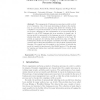799 search results - page 103 / 160 » Heterogeneous reasoning in learning to model |
IJWET
2007
13 years 7 months ago
2007
: Context-aware ubiquitous computing environments tend to be highly distributed and heterogeneous, while also featuring increased dynamism as elements, devices and middleware compo...
ILP
2007
Springer
14 years 1 months ago
2007
Springer
The management of business processes has recently received a lot of attention. One of the most interesting problems is the description of a process model in a language that allows ...
JMLR
2010
13 years 2 months ago
2010
Inducing a grammar from text has proven to be a notoriously challenging learning task despite decades of research. The primary reason for its difficulty is that in order to induce...
JIRS
2000
13 years 7 months ago
2000
Agents (hardware or software) that act autonomously in an environment have to be able to integrate three basic behaviors: planning, execution, and learning. This integration is man...
ATAL
2008
Springer
13 years 9 months ago
2008
Springer
The application of reinforcement learning algorithms to Partially Observable Stochastic Games (POSG) is challenging since each agent does not have access to the whole state inform...

